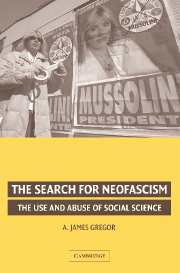Book contents
- Frontmatter
- Contents
- Preface
- Acknowledgments
- 1 The Decay of an Enterprise
- 2 Fascism
- 3 Neofascism: Some Presumptive Candidates
- 4 Julius Evola, Fascism, and Neofascism
- 5 Black Nationalism and Neofascism: Marcus Garvey and the Universal Negro Improvement Association
- 6 Black Nationalism and Neofascism: Elijah Muhammad and the Lost-Found Nation of Islam
- 7 Islamofascism: Neofascism in the Middle East
- 8 Hindutva: The Case for a Saffron Fascism
- 9 Post-Maoist China: Fascism with Chinese Characteristics
- 10 Conclusions
- Index
5 - Black Nationalism and Neofascism: Marcus Garvey and the Universal Negro Improvement Association
Published online by Cambridge University Press: 05 June 2012
- Frontmatter
- Contents
- Preface
- Acknowledgments
- 1 The Decay of an Enterprise
- 2 Fascism
- 3 Neofascism: Some Presumptive Candidates
- 4 Julius Evola, Fascism, and Neofascism
- 5 Black Nationalism and Neofascism: Marcus Garvey and the Universal Negro Improvement Association
- 6 Black Nationalism and Neofascism: Elijah Muhammad and the Lost-Found Nation of Islam
- 7 Islamofascism: Neofascism in the Middle East
- 8 Hindutva: The Case for a Saffron Fascism
- 9 Post-Maoist China: Fascism with Chinese Characteristics
- 10 Conclusions
- Index
Summary
Julius Evola was always an improbable Fascist. He insisted that the ideas he defended were not Fascist; they were “superior and anterior to Fascism.” The journalists who early sought out “neofascists” after the Second World War should certainly have been aware that Evola was never considered to have been a Fascist during the years of Mussolini's regime. It was known that Giuseppe Bottai, a prominent Fascist gerarch, had dismissed Evola's ideas as a “mass of ill-digested and arbitrarily coupled notions.” Bottai's distain was not unique. Almost every major Fascist intellectual rejected Evola's strange ideas. Evola, in fact, consistently denied he was ever a Fascist. All that notwithstanding, journalists and scholars seeking neofascists and neofascism have consistently argued that Evola was the major source of neofascist ideas in post–World War II Europe. His name still appears regularly in almost every contemporary volume devoted to neofascism.
Conversely, scholars have long been aware that during the interwar years Marcus Garvey, the leader of the Universal Negro Improvement Association (UNIA), insisted that he and his organization “were the first Fascists,” and went on to claim that “when we had 100,000 disciplined men, and were training children, Mussolini was still unknown. Mussolini copied our fascism.”
Knowing that, there has been literally no discussion of the “fascism” of Marcus Garvey. Evola, who never claimed to be a Fascist, and whose work was uniformly dismissed by Fascist intellectuals during the years of Mussolini's rule, has been pressed into service as the source of contemporary neofascism for half a century.
- Type
- Chapter
- Information
- The Search for NeofascismThe Use and Abuse of Social Science, pp. 111 - 136Publisher: Cambridge University PressPrint publication year: 2006

